| کد مقاله | کد نشریه | سال انتشار | مقاله انگلیسی | نسخه تمام متن |
|---|---|---|---|---|
| 2580045 | 1561597 | 2016 | 9 صفحه PDF | دانلود رایگان |
• Honokiol alleviated MG-induced cell death and ROS.
• Honokiol alleviated MG-induced cardiolipin peroxidation and inflammatory cytokines.
• MG induction of RAGE was reduced by pretreatment with honokiol.
• Honokiol increased the activity of glyoxalase I and the levels of Nrf2 and glutathione.
• Honokiol reduced MG-induced mitochondrial dysfunction.
Honokiol is an active compound isolated from Magnolia officinalis that has been used without notable side effects in traditional medicine. We investigated the effects of honokiol against methylglyoxal (MG)-induced cytotoxicity in MC3T3-E1 osteoblast cells and the possible molecular mechanism(s) involved. The results showed that honokiol alleviated MG-induced cell death and the production of intracellular ROS, mitochondrial superoxide, cardiolipin peroxidation, and inflammatory cytokines. MG induction of the soluble receptor for advanced glycation end product (AGE) was reduced by pretreatment with honokiol. Furthermore, honokiol increased the levels of Nrf2 and increased the levels of glutathione and the activity of glyoxalase I. Pretreatment with honokiol prior to MG exposure reduced MG-induced mitochondrial dysfunction and alleviated MG-induced reduction of nitric oxide and PGC1α levels, suggesting that honokiol may induce mitochondrial biogenesis. It was concluded that honokiol could be useful in the attenuation of MG-induced cell damage.
Journal: Chemico-Biological Interactions - Volume 244, 25 January 2016, Pages 169–177
